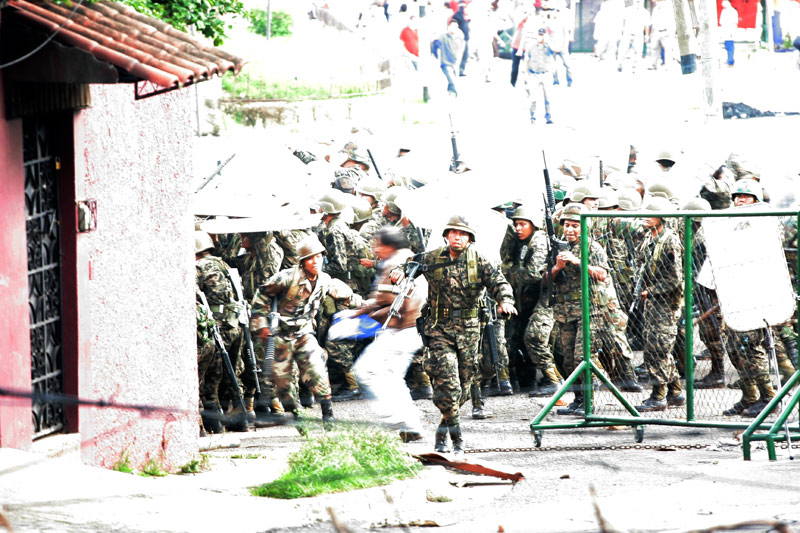So I’ve been poking around the Hillary Clinton emails released by Wikileaks. Though the most recent dump pertains to wars in the Middle East, I’ve used to occasion to dive into earlier content about Honduras specifically.

While popular media focuses on Benghazi, it is clear that the worst event that is definitely connected to Clinton is the 2009 military coup in Honduras against democratically-elected President Manuel Zelaya. Clinton has openly admitted her role in backing the military, under false pretenses concerning Zelaya setting himself up as a dictator. The story linked:
The question of Zelaya was anything but moot. Latin American leaders, the United Nations General Assemblyand other international bodies vehemently demanded his immediate return to office. Clinton’s defiant and anti-democratic stance spurred a downward slide in U.S. relations with several Latin American countries, which has continued. It eroded the warm welcome and benefit of the doubt that even the leftist governments in region offered to the newly installed Obama administration a few months earlier.
Clinton’s false testimony is even more revealing. She reports that Zelaya was arrested amid “fears that he was preparing to circumvent the constitution and extend his term in office.” This is simply not true. As Clinton must know, when Zelaya was kidnapped by the military and flown out of the country in his pajamas on June 28, 2009, he was trying to put a consultative, nonbinding poll on the ballot to ask voters whether they wanted to have a real referendum on reforming the constitution during the scheduled election in November. It is important to note that Zelaya was not eligible to run in that election. Even if he had gotten everything he wanted, it was impossible for Zelaya to extend his term in office. But this did not stop the extreme right in Honduras and the United States from using false charges of tampering with the constitution to justify the coup.
Not surprisingly, allowing the military to seize power has led to a Honduras that is substantially more violent, unsafe for women and LGBT+, and perpetuated the centuries-long cycle of civilian-turned-military rule in Latin America. If generals can seize power and face no lasting sanction from the United States, then every democratic government is perpetually on the edge. As we have seen all over the world, democratization is shallow when all policy is subject to a de facto veto by the military. There is a very real limit to how much progress can be made in the Americas if the State Department continues to sanction militarization.

I thought this passage from Hugo Llorens, the US ambassador, was very telling of how America really thought of Zelaya.
We found him unyielding in his position. He says that he is unwilling to return to the talks with the M [ed: interim president Roberto Micheletti] regime since he doesn’t believe they are acting in good faith.
He insisted that M was not interested in stepping down and would do everything in his power to ensure that he (Z) would never be restored. He stressed that if he was not restored the elections would not be legitimate and those involved in the coup would not be able to free themselves from the stigma of their actions. Z seemed totally out of touch and seemed completely focused on himself and that the future of Honduras and the future of democracy in the entire region hinged on his restoration to power prior to the elections. He predicted that if he was not restored that Honduras faced a bleak future led by a weak and discredited government and with a high probability of violence and civil conflict. I attempted to make him see the obligation he and M had in creating conditions for a workable step-by-step process that would allow for the regime to step down, ensure the holding of free and fair elections, and the smooth transfer of power, hopefully from the legitimate head of state to the newly elected president.
I will report the details on the high side, but at this moment I see no probability that Z will seek to go back to the table under the TSJA framework. He may be gaming it in order to put maximum pressure on M prior to the elections.
While on the surface the State Department backed the restoration, they saw no issue with a transition period that did not reverse the coup. As we can see in 2016, Zelaya was totally, totally right about how the coup affected Honduran democracy and a move towards violence and civil strife. Instead of seeing the fundamental legitimacy crisis caused when the peaceful transfer of power between administrations is interrupted, Clinton’s team saw vanity and pride.
This attitude has cost many lives. The unaccompanied minors surge across the southern border included many from a dysfunction post-coup Honduras. Central American stability can never be lasting if there is an exodus from some countries rife with murder, kidnapping, and sexual assault.
I don’t support Hillary Clinton. There are many reasons why, but it goes beyond her image, words, and political party. Her actions have hurt many. Honduras is a situation of her creation; it’s not something we paint by association with her husband’s presidency. Instead of Benghazi hysteria, citizens should remember something that is not only real, but that she publicly admits to.
Hiya,
I believe she’ll keep the machine going with campaign interest groups and not about changing things. Nice get your input on this issue on your blog. Love it.
LikeLike